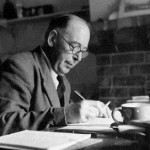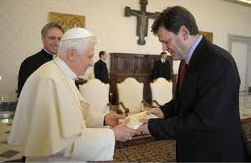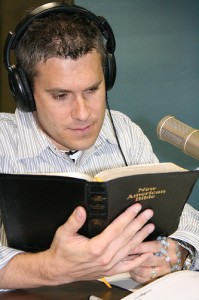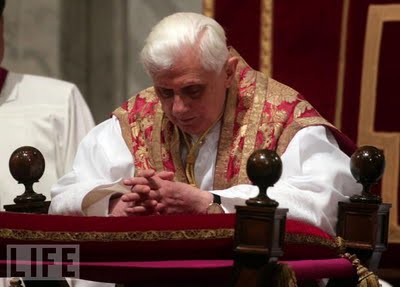“Narnia And Beyond: A Guide to the Fiction of C. S. Lewis” by Thomas Howard is fantastic.  Dr. Howard is regarded as one of the leading authorities on the works of C. S. Lewis, and with remarkable clarity he shares with us all the Lewis that has touched the hearts and minds of so many generations, both young and old. It is always a joy to talk with Thomas Howard, but this conversation was particularly enlightening.
Dr. Howard is regarded as one of the leading authorities on the works of C. S. Lewis, and with remarkable clarity he shares with us all the Lewis that has touched the hearts and minds of so many generations, both young and old. It is always a joy to talk with Thomas Howard, but this conversation was particularly enlightening.
[powerpress]
You can check out the book at igantius.com
Tags: c s lewis, catholic, catholic podcast, catholic prayer, cathollc spirituality, hearts, ignatius press, joy, leading authorities, narnia, thomas howard, works
This entry was posted on Thursday, December 9th, 2010 at 4:37 pm
You can follow any responses to this entry through the RSS 2.0 feed.
Second Thursday of Advent IÂ – from the Gospel of Matthew the full reading and reflection
“He is Elijah who is to come”
an excerpt from today’s reflection by Don Schwager:
God may call some of us to be martyrs for our faith in Christ. But for most of us our call is to be dry martyrs who bear testimony to the joy of the gospel in the midst of daily challenges, contradictions, temptations and adversities which come our way as we follow the Lord Jesus. What attracts others to the gospel? When they see Christians loving their enemies, being joyful in suffering, patient in adversity, pardoning injuries, and showing comfort and compassion to the hopeless and the helpless. Jesus tells us that we do not need to fear our adversaries. He will give us sufficient grace, strength, and wisdom to face any trial and to answer any challenge to our faith. Are you eager to witness to the joy and freedom of the gospel?
“Lord Jesus, by your cross you have redeemed the world. Fill me with joy and confidence and make me a bold witness of your saving truth that others may know the joy and freedom of the gospel.”
for the full reflection visit : Daily Reading and Meditation
Tags: advent, catholic, catholic podcast, catholic prayer, cathollc spirituality, don schwager, gospel of matthew, john the baptist, martyrs
This entry was posted on Thursday, December 9th, 2010 at 6:23 am
You can follow any responses to this entry through the RSS 2.0 feed.
An unprecedented book-length interview given by a Pope, Light of the World by German journalist Peter Seewald, is an absolute must for those who look to our Holy Father for guidance and direction as we  attempt to deepen our relationship with Jesus Christ. I am beyond delighted to have Amy Welborn with us to discuss this important conversation Pope Benedict XVI is actually having with us all. Amy, the author of numerous books, has written extensively on the teachings of Pope Benedict; I couldn’t have anyone better to go “Inside the Pages” of this work that tackles some the greatest issues facing the world today.
attempt to deepen our relationship with Jesus Christ. I am beyond delighted to have Amy Welborn with us to discuss this important conversation Pope Benedict XVI is actually having with us all. Amy, the author of numerous books, has written extensively on the teachings of Pope Benedict; I couldn’t have anyone better to go “Inside the Pages” of this work that tackles some the greatest issues facing the world today.
[powerpress]
Check out Amy Welborn’s blog “Charlotte was Both“
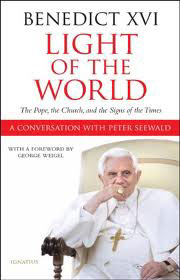 You can find our more at igantius.com the website for Ignatius Press
You can find our more at igantius.com the website for Ignatius Press
Tags: amy welborn, catholic, catholic podcast, catholic prayer, cathollc spirituality, ignatius press, peter seewald, pope benedict, pope benedict xvi
This entry was posted on Tuesday, December 7th, 2010 at 7:28 am
You can follow any responses to this entry through the RSS 2.0 feed.
Episode 9 – Sexuality, Marriage, Contraception
Roots of the Faith – From the Church Fathers to You with Mike Aquilina,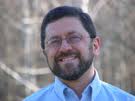 makes clear that just as an acorn grows into a tree and yet remains the same plant, so the Catholic Church is a living organism that has grown from the faith of the earliest Christians into the body of Christ we know today. Hosted by Kris McGregor
makes clear that just as an acorn grows into a tree and yet remains the same plant, so the Catholic Church is a living organism that has grown from the faith of the earliest Christians into the body of Christ we know today. Hosted by Kris McGregor
[powerpress]
Also visit Mike’s “Discerning Hearts†page for more audio downloads and information
Tags: catholic, catholic podcast, catholic prayer, cathollc spirituality, church fathers, Contraception, fathers of the church, marriage, mike aquilina, sexuality
This entry was posted on Sunday, December 5th, 2010 at 3:10 pm
You can follow any responses to this entry through the RSS 2.0 feed.
Episode 7 -The Way of Mystery: The Eucharist and Moral Living–  The Liturgy of the Word part 1 Christ entering us through language. The difference in our attitude of being an “audience” and being in an attitude of prayer. How the Word sets us free.
The Liturgy of the Word part 1 Christ entering us through language. The difference in our attitude of being an “audience” and being in an attitude of prayer. How the Word sets us free.
[powerpress]
Deacon James Keating, PhD, the director of Theological Formation for the Institute for Priestly Formation, located at Creighton University, in Omaha, is making available to â€Discerning Hearts†and all who listen, his series of programs entitled “The Way of Mysteryâ€.
 The Vatican II documents remind us that the spiritual journey is not made in a vacuum, that God has chosen to save us, not individually, but as The People of God. The Eucharist must help Christians to make their choices by discerning out of Christ’s paschal mystery. For this process to take place, however, Christians must first understand how the Eucharist puts them in touch with Christ’s passion, death, and resurrection, and what concrete implications being in touch with this mystery has for their daily lives.
The Vatican II documents remind us that the spiritual journey is not made in a vacuum, that God has chosen to save us, not individually, but as The People of God. The Eucharist must help Christians to make their choices by discerning out of Christ’s paschal mystery. For this process to take place, however, Christians must first understand how the Eucharist puts them in touch with Christ’s passion, death, and resurrection, and what concrete implications being in touch with this mystery has for their daily lives.
For more information on the “Institute of Priestly Formation†and for other material available by Deacon Keating, just click here
Don’t forget to pickup a copy of “Communion with Christ†, it is one of the best audio sets on prayer…ever!
Check out Deacon Keating’s “Discerning Heart†page
Tags: catholic, catholic podcast, catholic prayer, cathollc spirituality, creighton university, Deacon James Keating, discerning heart, institute for priestly formation, james keating, liturgy of the word, paschal mystery, prayer, the eucharist, theological formation, way of mystery
This entry was posted on Sunday, December 5th, 2010 at 1:27 pm
You can follow any responses to this entry through the RSS 2.0 feed.
1. Five tangible things people can to do to start reading the Bible. Which translation is best for you? Best times to study and how long? Journaling? Other resources?
2. What is a “good†teen bible?
[powerpress]
Mark Hart is an author, speaker, director and teacher, Mark’s work both written and spoken, is known across the country and world. While he serves as the Vice President of LIFE TEEN, he is known to tens of thousands simply as the “Bible Geek ®†Mark passionately echoes the gospel to all he encounters. He is as deep as he is funny, and his love for his wife and daughters is second only to his immense love for Jesus Christ.
Visit Mark at www.lifeteen.com
Tags: Bible Mark answers, catholic, catholic podcast, catholic prayer, cathollc spirituality, life teen, mark hart, sacred scripture, teen bible
This entry was posted on Sunday, December 5th, 2010 at 6:29 am
You can follow any responses to this entry through the RSS 2.0 feed.
Second Sunday of Advent Cycle A – from the Gospel Matthew the full reading and reflection
“He will baptize you with the Holy Spirit and with fire”
an excerpt from today’s reflection by Don Schwager: 
John the Baptist’s life was fueled by one burning passion – to point others to Jesus Christ and to the coming of his kingdom. Who is John the Baptist and what is the significance of his message for our lives? Scripture tells us that John was filled with the Holy Spirit even from his mother’s womb (Luke 1:15, 41) by Christ himself, whom Mary had just conceived by the Holy Spirit. When Mary visited her cousin Elizabeth John lept in her womb as they were filled with the Holy Spirit (Luke 1:41). The fire of the Spirit dwelt in John and made him the forerunner of the coming Messiah. John was led by the Spirit into the wilderness prior to his ministry where he was tested and grew in the word of God. John’s clothing was reminiscent of the prophet Elijah (see Kings 1:8). John broke the prophetic silence of the previous centuries when he began to speak the word of God to the people of Israel. His message was similar to the message of the Old Testament prophets who chided the people of God for their unfaithfuless and who tried to awaken true repentance in them. Among a people unconcerned with the things of God, it was his work to awaken their interest, unsettle them from their complacency, and arouse in them enough good will to recognize and receive Christ when he came. Are you eager to hear God’s word and to be changed by it through the power of the Holy Spirit?
Jesus tells us that John the Baptist was more than a prophet (Luke 7:26). John was the voice of the Consoler who is coming (John 1:23; Isa iah 40:1-3). He completed the cycle of prophets begun by Elijah (Matthew 11:13-14). What the prophets had carefully searched for and angels longed to see, now came to completion as John made the way ready for the coming of the Messiah, God’s Annointed Son, the Lord Jesus Christ. With John the Baptist, the Holy Spirit begins the restoration to the human race of the “divine likeness”, prefiguring what would be achieved with and in the Lord Jesus. John’s baptism was for repentance – turning away from sin and taking on a new way of life according to God’s word. Our baptism in Jesus Christ by water and the Spirit results in a new birth and entry into God’s kingdom as his beloved sons and daughters (John 3:5). Jesus is ready to give us the fire of his Spirit that we may radiate the joy and truth of the gospel to a world in desparate need of God’s light and truth. His word has power to change and transform our lives that we may be lights pointing others to Christ. Like John the Baptist, we too are called to give testimony to the light and truth of Jesus Christ. Do you point others to Christ in the way you live, work, and speak?
iah 40:1-3). He completed the cycle of prophets begun by Elijah (Matthew 11:13-14). What the prophets had carefully searched for and angels longed to see, now came to completion as John made the way ready for the coming of the Messiah, God’s Annointed Son, the Lord Jesus Christ. With John the Baptist, the Holy Spirit begins the restoration to the human race of the “divine likeness”, prefiguring what would be achieved with and in the Lord Jesus. John’s baptism was for repentance – turning away from sin and taking on a new way of life according to God’s word. Our baptism in Jesus Christ by water and the Spirit results in a new birth and entry into God’s kingdom as his beloved sons and daughters (John 3:5). Jesus is ready to give us the fire of his Spirit that we may radiate the joy and truth of the gospel to a world in desparate need of God’s light and truth. His word has power to change and transform our lives that we may be lights pointing others to Christ. Like John the Baptist, we too are called to give testimony to the light and truth of Jesus Christ. Do you point others to Christ in the way you live, work, and speak?
“Lord, let your light burn brightly in my heart that I may know the joy and freedom of your kingdom. Fill me with your Holy Spirit and empower me to witness the truth of your gospel and to point others to Jesus Christ.”
for the full reflection visit : Daily Reading and Meditation
Tags: catholic, catholic podcast, catholic prayer, cathollc spirituality, daily reflections, don schwager, kingdom of heaven, kingdom of heaven is at hand, meditation, reflection, season of advent, second sunday of advent
This entry was posted on Sunday, December 5th, 2010 at 12:05 am
You can follow any responses to this entry through the RSS 2.0 feed.
Going deep into the heart of the Word has never taken on more meaning than when discussing Pope Benedict XVI Apostolic Exhortation “Verbum Domini” (The Word of the Lord). Since the Holy Father is rather busy at this time, the next best person to discuss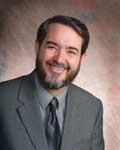 it with would be Dr. Scott Hahn. Though he too is extraordinarily active, Dr. Hahn took time to to break open this extraordinarily important and beautiful gift for us.
it with would be Dr. Scott Hahn. Though he too is extraordinarily active, Dr. Hahn took time to to break open this extraordinarily important and beautiful gift for us.
[powerpress]
Do what the doctor (Dr. Hahn, of course) has ordered, go to Vatican.va to read and download “Verbum Domini”
Be sure to visit The S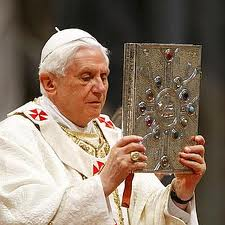 t. Paul Center of Biblical Theology to sign up for free online studies and to learn more “from the heart of the Church”.
t. Paul Center of Biblical Theology to sign up for free online studies and to learn more “from the heart of the Church”.
Tags: catholic, catholic podcast, catholic prayer, cathollc spirituality
This entry was posted on Friday, December 3rd, 2010 at 7:05 pm
You can follow any responses to this entry through the RSS 2.0 feed.
In my book, every missionary is great. It takes a great amount of courage and zeal, along with a great deal of faith, hope, and love, to proclaim Christ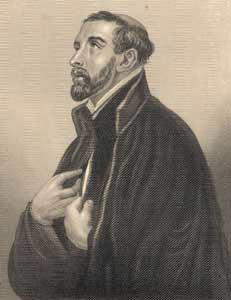 crucified to the world no matter what age you live in, no matter where you travel…whether next door or to a far away land. One of those who has inspired so many is St. Francis Xavier. Omar Gutierrez does another fine job bringing this saint’s witness deeper into our hearts….
crucified to the world no matter what age you live in, no matter where you travel…whether next door or to a far away land. One of those who has inspired so many is St. Francis Xavier. Omar Gutierrez does another fine job bringing this saint’s witness deeper into our hearts….
For the Love of Neighbor…
by Omar F. A. Gutierrez  Along a rather busy street in Rome, as one walks along with various-colored motorini passing by in the typical Italian nonchalance, there stands a rather impressive façade of a Church. Churches in Rome are not rarities. Edifices of worship, shrines and even bits of images of the Blessed Virgin dot the city’s corners and crevices throughout. Here, though, with buildings rising tightly upward, is a church with a piazza that stands resolute. The Church is named after Jesus and is referred to by the Italian Gesù.
Along a rather busy street in Rome, as one walks along with various-colored motorini passing by in the typical Italian nonchalance, there stands a rather impressive façade of a Church. Churches in Rome are not rarities. Edifices of worship, shrines and even bits of images of the Blessed Virgin dot the city’s corners and crevices throughout. Here, though, with buildings rising tightly upward, is a church with a piazza that stands resolute. The Church is named after Jesus and is referred to by the Italian Gesù.
Inside the Gesù, amidst the distracting busyness of the Baroque interior, one will find the remains of St. Ignatius of Loyola, the punctilious and perceptive Spaniard who founded the order known as the Society of Jesus, the Jesuits. Across the nave, though, is an oddly obvious glass display case gilt with gold and silver. Above this floats the golden form of an angel whose wings and flowing robes give a good deal of attention to the case, for inside the case, in that only-too-Catholic fashion, is… a forearm.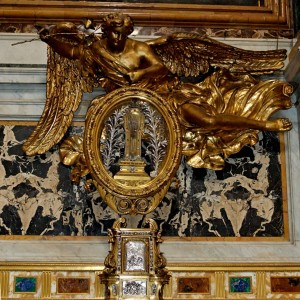
The forearm belonged, or I suppose I should say that it still belongs to another Spaniard who met St. Ignatius at the University of Paris whilst the two of them studied theology. The forearm is on display not in mere virtue of its owner’s friendship with Ignatius. It is on display because its owner, St. Francis Xavier, was one of the most successful missionaries in the history of Christianity. That forearm, black and no doubt by now quite brittle, baptized more souls than perhaps any since the early baptisms of thousands one reads about in the Scriptures.
St. Francis Xavier was born in 1506. When he met St. Ignatius of Loyola, it did not take long for him and five others to join Ignatius in 1534 and be those magnificent seven souls to start the Jesuit order that would transform the world. Nor did it take long, after their order had found some grounding, for St. Francis to be sent by St. Ignatius to go and preach to the world, as Jesus had commanded. St. Francis and his companions, Fr. Paul of Camarino and Francis Mansilhas, sailed from Portugal for India in 1541.
The story of his work in India is dazzling. Certainly Christianity had already been in parts of India, and been there for over a thousand years. However, large swaths of the land were still not evangelized, and anyway the Christians there needed the catechetical and spiritual support of ones like St. Francis, who traveled extensively regardless of danger, time, or geography. What is more astonishing is that the zeal which St. Francis held in that fiery heart of his was not quenched by the successes of India, Ceylon, and the nearby regions. St. Francis heard of a land in which Christianity had never come, Japan, and was compelled to do something about it.
In 1549, he and some companions set out for Japan and landed in Kagoshima. In a year they had 100 converts. Considering this a pittance, Francis pressed onward. At Hirado he was well received and converts came in the droves. His forearm tired at the effort of so many baptisms. Still he pressed on. By the time he left Japan in 1551 at least 2,000 Japanese had been baptized. But there were more lands to be given the Gospel.
I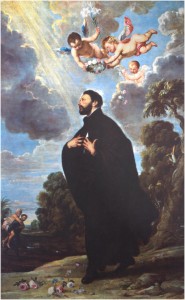 n August of 1552, St. Francis was off again, this time to China. Unfortunately, he fell ill there and died a short time after, on December 3, 1552.
n August of 1552, St. Francis was off again, this time to China. Unfortunately, he fell ill there and died a short time after, on December 3, 1552.
Some of the marks of St. Francis’ story are truly wonderful to relate, not the least of these is the sheer number of baptisms he performed during his eleven years of service in Asia. Modern estimates of his work put him at about 30,000 baptisms. To put that in perspective a bit, that means that St. Francis Xavier would have baptized between 7 and 8 people every day for eleven straight years.
Though he worked to learn the many languages of the lands in which he preached, of course keeping in mind that he would have already known Basque, Spanish, Latin, French, Italian, and Portuguese, he did not have the gift of tongues. The languages he picked up on in India and elsewhere were the result of grueling work on his part. He was not gifted as some are with languages. He had to work hard. This therefore meant that he got creative. He used art a good deal in the attempt to communicate the fundamentals of the faith and as a tool to remember creeds. He also met the people “where they were at,†as the saying goes these days. To the Indians he lived as they did in extreme poverty, eating only rice and water, sleeping on the ground in a hut. In Japan, this would not do. So he dressed richly and presented the local magistrate with fine gifts. This was well received, and he gained instant respect and thus an audience with attentive ears.
Just a couple of last points about St. Francis: first, his travels throughout the world included missionary work not just for the unbaptized but almost especially to already baptized Catholics. Imagine you’ve just sailed the seas for over a year in order to do work in a land far stranger to you than any you’ve ever visited. Upon arriving you discover that the port town is largely Christian. But then you witness what Fr. Butler will describe as the “ambition, avarice, usury, and debauchery†of the Christians there.
The sacraments were neglected, there were not four preachers and no priests outside the walls of Goa; when slaves were atrociously beaten, their masters counted the blows on the beads of their rosaries.
Fr. H. J. Colerdige, S.J. one of the biographers of St. Francis relates the following,
There has probably never yet been a zealous European missionary in any part of the heathen world in which Christians from his own country have been settled, or which they have occasionally visited for purposes of commerce, who has not found among them the worst enemies to his work. No exception can be made as to this lamentable truth in favour of Catholic nations: Spaniards, Frenchmen, Portuguese have as much to answer for in this respect as Dutchmen and Englishmen.
In other words, no Christian missionary has been spared the embarrassment of having to explain to the prospective flock the atrocious behavior of Christians. St. Francis had clearly a lot to do for the Christians already there in Goa. Normally, we…normally I would have thrown in the towel at that point. What is the purpose of preaching the Gospel when the very people who are supposed to be living it are behaving so poorly? Have you not asked yourself thi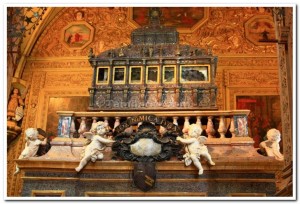 s question?
s question?
The rest of St. Francis Xavier in the Basilica of Bom Gesu in Goa, India
I dare say that we’ve all experienced something like this in our lives. Have we heard the line that the Church is in more danger of corruption from Catholics within than from non-Catholics without? There is something true in that saying I think. Yet St. Francis pressed on. His dedication to Christ Jesus was so deeply ingrained in him, that he did not need to know that all Catholics would behave properly for him to fulfill his vocation. All he needed to do was to listen to God, to press on living for Him.
Lastly, I don’t want to suggest that St. Francis was callously dismissive of the atrocities he found. Of them he wrote that they became “a permanent bruise on my soul.†He allowed the love for Christ to inform his care for his neighbor, over against those of his own faith. He wrote once, when an Indian was abducted for the slave trade,
Would the Portuguese be pleased if one of the Hindus were to take a Portuguese by force and carry him up country? The Indians must have the same feelings.
This ability of St. Francis Xavier to be driven by his compassion for his 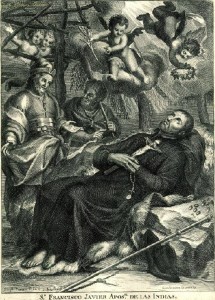 neighbor well enough to see beyond the natural affinities of nation, ethnicity, and faith… this ability to defend the rights of these downtrodden strangers, only brings me to wonder how we can be Catholic, today in the U.S., and not desire for ourselves more largeness of heart for the immigrant. Immigration is too large an issue to enter into here, but given the life of St. Francis presented above, how do we really think he would behave in our current time? Would he deny prenatal care to a woman because her proximity is illegal? Would he demand his neighbor produce proof of eligibility before offering them something as simple as shelter from the storm? No, St. Francis Xavier wouldn’t, not the great missionary, not the grand heart, not the forearm that helped to reconcile strangers in his valley of tears to the God of our homeland in the heavens.
neighbor well enough to see beyond the natural affinities of nation, ethnicity, and faith… this ability to defend the rights of these downtrodden strangers, only brings me to wonder how we can be Catholic, today in the U.S., and not desire for ourselves more largeness of heart for the immigrant. Immigration is too large an issue to enter into here, but given the life of St. Francis presented above, how do we really think he would behave in our current time? Would he deny prenatal care to a woman because her proximity is illegal? Would he demand his neighbor produce proof of eligibility before offering them something as simple as shelter from the storm? No, St. Francis Xavier wouldn’t, not the great missionary, not the grand heart, not the forearm that helped to reconcile strangers in his valley of tears to the God of our homeland in the heavens.
Perhaps, then, take time this day of St. Francis Xavier and consider the immigrant in our midst, the stranger in a strange land. If you find your heart hardened by the vituperative rhetoric that so dominates our political culture, then I ask you only to pray to St. Francis the Spaniard, St. Francis the missionary, St. Francis the lover who allowed that love to bring Jesus to the world. Perhaps we might raise a forearm, glass in hand of course, and toast with a friend the same love that saved a wretch like me.
In that spirit: St. Francis Xavier…pray for us!
 Thanks Omar for another great post!!! visit Regnum Novum for more by Omar
Thanks Omar for another great post!!! visit Regnum Novum for more by Omar
Tags: catholic, catholic podcast, catholic prayer, cathollc spirituality, china, churches in rome, india, martyr, missionary, society of jesus, st francis xavier, st. ignatius of loyola
This entry was posted on Friday, December 3rd, 2010 at 9:06 am
You can follow any responses to this entry through the RSS 2.0 feed.
[powerpress]
“When they saw the dumb speaking, the maimed whole, the lame walking,
and the blind seeing …they glorified the God of Israel”
an excerpt from today’s reflection: 
In the multiplication of the loaves and fishes we see a sign and a symbol of what God always does. God knows our needs and he cares. When God gives, he gives in abundance. The gospel account records that the leftovers from the miraculous meal was more than seven times the amount they began with. Seven is a symbol of completion and wholeness. When God gives, he gives until we are satisfied. When God works for his people he gives abundantly – more than we could deserve and more than we need. He nourishes us with his life-giving word and with the bread of heaven. In the kingdom of heaven God will feast us at his banquet table. Are you satisfied with God’s provision for you? And do you long with expectant hope for the coming of his kingdom in all its fullness?
Lord, you alone can satisfy the longing and hunger in our hearts. May I thirst for your kingdom and find joy in your presence. Give me the true bread of heaven and nourish me with your life-giving word.”
for the full reflection visit : Daily Reading and Meditation
Tags: advent, catholic, catholic podcast, catholic prayer, cathollc spirituality, kingdom of heaven, loaves and fishes, scripture reflection
This entry was posted on Friday, December 3rd, 2010 at 12:01 am
You can follow any responses to this entry through the RSS 2.0 feed.
Thank you Terry Fenwick…
Tags: catholic, catholic podcast, catholic prayer, cathollc spirituality, felicity, martyr, mystic, mystic of the Church, perpetua, song
This entry was posted on Thursday, December 2nd, 2010 at 1:19 pm
You can follow any responses to this entry through the RSS 2.0 feed.
“God’s Promises Are Always Greater Than Our Hopes”
VATICAN CITY, DEC. 1, 2010 (vatican.va).- Here is a translation of the address Benedict XVI gave today during the general audience in Paul VI Hall.
Dear Brothers and Sisters,
I still remember with great joy the Apostolic Journey I made in the United Kingdom last September. England is a land that has given birth to a great many distinguished figures who enhanced Church history with their testimony and their teaching. One of them, venerated both in the Catholic Church and in the Anglican Communion, is the mystic Julian of Norwich, of whom I wish to speak this morning.
The — very scant — information on her life in our possession comes mainly from her Revelations of Divine Love in Sixteen Showings, the book in which this kindly and devout woman set down the content of her visions.
It is known that she lived from 1342 until about 1430, turbulent years both for the Church, torn by the schism that followed the Pope’s return to Rome from Avignon, and for the life of the people who were suffering the consequences of a long drawn-out war between the Kingdoms of England and of France. God, however, even in periods of tribulation, does not cease to inspire figures such as Julian of Norwich, to recall people to peace, love and joy.
As Julian herself recounts, in May 1373, most likely on the 13th of that month, she was suddenly stricken with a very serious illness that in three days seemed to be carrying her to the grave. After the priest, who hastened to her bedside, had shown her the Crucified One not only did Julian rapidly recover her health but she received the 16 revelations that she subsequently wrote down and commented on in her book, Revelations of Divine Love.
And it was the Lord himself, 15 years after these extraordinary events, who revealed to
her the meaning of those visions.
“‘Would you learn to see clearly your Lord’s meaning in this thing? Learn it well: Love was his meaning. Who showed it to you? Love…. Why did he show it to you? For Love’…. Thus I was taught that Love was our Lord’s meaning†(Julian of Norwich, Revelations of Divine Love,Chapter 86).
Inspired by divine love, Julian made a radical decision. Like an ancient anchoress, she decided to live in a cell located near the church called after St Julian, in the city of Norwich — in her time an important urban centre not far from London.
She may have taken the name of Julian precisely from that Saint to whom was dedicated the church in whose vicinity she lived for so many years, until her death.
This decision to live as a “recluseâ€, the term in her day, might surprise or even perplex us. But she was not the only one to make such a choice. In those centuries a considerable number of women opted for this form of life, adopting rules specially drawn up, for them, such as the rule compiled by St Aelred of Rievaulx.
The anchoresses or “reclusesâ€, in their cells, devoted themselves to prayer, meditation and study. In this way they developed a highly refined human and religious sensitivity which earned them the veneration of the people. Men and women of every age and condition in need of advice and comfort, would devoutly seek them. It was not, therefore, an individualistic choice; precisely with this closeness to the Lord, Julian developed the ability to be a counsellor to a great many people and to help those who were going through difficulties in this life.
We also know that Julian too received frequent visitors, as is attested by the autobiography of another fervent Christian of her time, Margery Kempe, who went to Norwich in 1413 to receive advice on her spiritual life. This is why, in her lifetime, Julian was called “Dame Julianâ€, as is engraved on the funeral monument that contains her remains. She had become a mother to many.
Men and women who withdraw to live in God’s company acquire by making this decision a great sense of compassion for the suffering and weakness of others. As friends of God, they have at their disposal a wisdom that the world — from which they have distanced themselves — does not possess and they amiably share it with those who knock at their door.
I therefore recall with admiration and gratitude the women and men’s cloistered monasteries. Today more than ever they are oases of peace and hope, a precious treasure for the whole Church, especially since they recall the primacy of God and the importance, for the journey of faith, of constant and intense prayer.
It was precisely in the solitude infused with God that Julian of Norwich wrote her Revelations of Divine Love. Two versions have come down to us, one that is shorter, probably the older, and one that is longer. This book contains a message of optimism based on the certainty of being loved by God and of being protected by his Providence.
In this book we read the following wonderful words: “And I saw full surely that ere God made us he loved us; which love was never lacking nor ever shall be. And in this love he has made all his works; and in this love he has made all things profitable to us; and in this love our life is everlasting… in which love we have our beginning. And all this shall we see in God, without end†(Revelations of Divine Love, Chapter 86).
The theme of divine love recurs frequently in the visions of Julian of Norwich who, with a certain daring, did not hesitate to compare them also to motherly love. This is one of the most characteristic messages of her mystical theology.
The tenderness, concern and gentleness of God’s kindness to us are so great that they remind us, pilgrims on earth, of a mother’s love for her children. In fact the biblical prophets also sometimes used this language that calls to mind the tenderness, intensity and totality of God’s love, which is manifested in creation and in the whole history of salvation that is crowned by the Incarnation of the Son.
God, however, always excels all human love, as the Prophet Isaiah says: “Can a woman forget her sucking child, that she should have no compassion on the son of her womb? Even these may forget, yet I will never forget you†(Is 49:15).
Julian of Norwich understood the central message for spiritual life:
God is love and it is only if one opens oneself to this love, totally and with total trust, and lets it become one’s sole guide in life, that all things are transfigured, true peace and true joy found and one is able to radiate it.
I would like to emphasize another point. The Catechism of the Catholic Church cites the words of Julian of Norwich when it explains the viewpoint of the Catholic faith on an argument that never ceases to be a provocation to all believers (cf. nn. 304-313, 314).
If God is supremely good and wise, why do evil and the suffering of innocents exist? And the Saints themselves asked this very question. Illumined by faith, they give an answer that opens our hearts to trust and hope: in the mysterious designs of Providence, God can draw a greater good even from evil, as Julian of Norwich wrote: “Here I was taught by the grace of God that I should steadfastly hold me in the Faith … and that … I should take my stand on and earnestly believe in … that ‘all manner of thing shall be wellâ€â€™ (The Revelations of Divine Love, Chapter 32).
Yes, dear brothers and sisters, God’s promises are ever greater than our expectations. If we present to God, to his immense love, the purest and deepest desires of our heart, we shall never be disappointed. “And all will be wellâ€, “all manner of things shall be wellâ€: this is the final message that Julian of Norwich transmits to us and that I am also proposing to you today. Many thanks.
Tags: anglican communion, benedict xvi, catholic, catholic podcast, catholic prayer, cathollc spirituality, julian of norwich, mystic, mystic of the Church, mystical experiences, Norwich, women of the middle ages
This entry was posted on Wednesday, December 1st, 2010 at 7:04 pm
You can follow any responses to this entry through the RSS 2.0 feed.
Audio prayer for the Holy Father’s Intentions
DECEMBER
The Experience of Personal Suffering as a Help to Others who Suffer
General: That our personal experience of suffering may be an
occasion for better understanding the situation of unease
and pain which is the lot of many people who are alone, sick
or aged, and stir us all to give them generous help.
Opening Our Doors to Christ
Missionary: That the peoples of the earth may open their doors to Christ
and to His Gospel of peace, brotherhood and justice.
Tags: benedict xvi, catholic, catholic podcast, catholic prayer, cathollc spirituality, holy father, personal experience, prayers
This entry was posted on Wednesday, December 1st, 2010 at 12:22 am
You can follow any responses to this entry through the RSS 2.0 feed.
“The Rite: The Making of a Modern Day Exorcist” is a fascinating exploration of the rite of exorcism from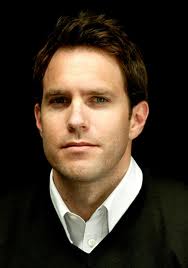 journalistic point of view. Following the training of a priest from California, Fr. Gary, in Rome, Matt Baglio chronicles his activities, as well as many aspects of the darker sides of the spiritual world. In a very real way, Matt demystifies exorcism and shows us what it really entails and the true gift it is to the Church. “The Rite” is now being made into a major motion
journalistic point of view. Following the training of a priest from California, Fr. Gary, in Rome, Matt Baglio chronicles his activities, as well as many aspects of the darker sides of the spiritual world. In a very real way, Matt demystifies exorcism and shows us what it really entails and the true gift it is to the Church. “The Rite” is now being made into a major motion 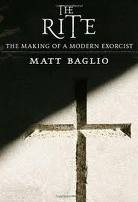 picture starring Anthony Hopkins.
picture starring Anthony Hopkins.
[powerpress]
Tags: catholic, catholic podcast, catholic prayer, cathollc spirituality, matt baglio, The Rite: The Making of a Modern Day Exorcist
This entry was posted on Tuesday, November 30th, 2010 at 5:11 am
You can follow any responses to this entry through the RSS 2.0 feed.
Going deep into the heart of the Word has never taken on more meaning than when discussing Pope Benedict XVI Apostolic Exhortation “Verbum Domini” (The Word of the Lord). Since the Holy Father is rather busy at this time, the next best person to discuss it with would be Dr. Scott Hahn. Though he too is extraordinarily active, Dr. Hahn took time to to break open this extraordinarily important and beautiful gift for us.
with would be Dr. Scott Hahn. Though he too is extraordinarily active, Dr. Hahn took time to to break open this extraordinarily important and beautiful gift for us.
[powerpress]
Do what the doctor (Dr. Hahn, of course) has ordered, go to Vatican.va to read and download “Verbum Domini”
Be sure to visit The S t. Paul Center of Biblical Theology to sign up for free online studies and to learn more “from the heart of the Church”.
t. Paul Center of Biblical Theology to sign up for free online studies and to learn more “from the heart of the Church”.
Tags: catholic, catholic podcast, catholic prayer, cathollc spirituality
This entry was posted on Monday, November 29th, 2010 at 8:36 am
You can follow any responses to this entry through the RSS 2.0 feed.


